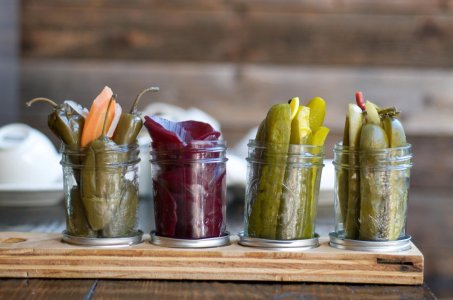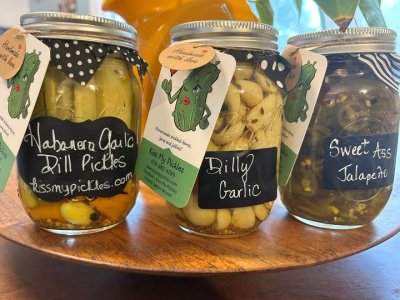Dietitians reveal the shocking truth about pickles – are they really healthy for you?
By
Michelle E.
- Replies 0
Disclaimer: The information provided in this article is for educational purposes only and is not intended as a substitute for professional medical advice, diagnosis, or treatment. Always consult your physician or other qualified healthcare providers with any questions you may have regarding a medical condition or before making any changes to your health regimen.
The world of snack foods, pickles have long held a place of honor on the American plate.
Whether they're adding a zesty crunch to a sandwich or being enjoyed as a low-calorie standalone treat, pickles have a unique appeal that transcends age and taste preferences.
As we age, we become particularly interested in how our dietary choices affect our health.
So, let's dive into the briny depths and explore the surprising health benefits and potential drawbacks of this beloved snack!
The Pickle Paradox: A Nutritional Deep Dive
Pickles start their life as cucumbers, which are then transformed through the magic of pickling.
This process can involve either a quick vinegar-based brine or a slower fermentation with salt and water. The latter not only imparts that distinctive tangy flavor but also introduces probiotics into the mix, which are beneficial for gut health.

Dietitian and diabetes educator Jess DeGore highlights the virtues of fermented pickles, noting their probiotic content and the role they play in supporting a healthy gut microbiome.
This, in turn, can boost immunity and enhance nutrient absorption, making your body more adept at utilizing the food you eat.
For those watching their weight, pickles are a smart snacking choice. They're low in calories but high in flavor, which can help satisfy cravings without derailing your diet.
And thanks to their cucumber origins, pickles are a source of beta-carotene, which the body converts into vitamin A, supporting vision and skin health.
The spices added during pickling, such as garlic and dill, are also antioxidant powerhouses. These can help reduce the risk of chronic diseases and promote overall well-being.
Moreover, pickles are a natural source of vitamin K, essential for blood clotting and bone health, and can provide small amounts of other vitamins like vitamin C.

Electrolytes and the Sodium Conundrum
One of the most significant health benefits of pickles is their electrolyte content, particularly sodium. This is crucial for maintaining fluid balance and nerve function.
For active individuals or those who sweat a lot, pickles can be a tasty way to replenish these essential nutrients.
However, moderation is key, as too much sodium can lead to high blood pressure and other health issues.
The American Heart Association recommends no more than 2,300 mg of sodium per day, with an ideal limit of 1,500 mg for most adults. Given that some pickles can be quite high in sodium, it's wise to opt for low-sodium varieties when possible.
Sweet pickles and bread-and-butter varieties may contain added sugars, which can impact blood sugar levels and overall calorie intake.
It's also important for individuals on blood-thinning medication to be mindful of the vitamin K content in pickles, as it may interact with their medication.
Incorporating Pickles Into a Healthy Diet
Pickles can be a versatile addition to your diet, whether you prefer the tang of sour pickles or the sweetness of their bread-and-butter cousins.
Sour pickles can add a burst of flavor to sandwiches and burgers, while sweet pickles can complement savory dishes beautifully.
For a healthier approach, consider pairing pickles with fresh vegetables or hummus.
You can also incorporate them into recipes like potato salad or coleslaw, where they can add flavor without overwhelming the dish.
The Pickle Juice Debate
Some swear by drinking pickle juice for its supposed benefits, such as alleviating muscle cramps and aiding in rehydration.
The vinegar in pickle juice is also thought to support digestion and help regulate blood sugar levels.
However, the high sodium content and acidity must be considered, especially for those with hypertension or dental concerns.
Pickles, in moderation, can be a healthy addition to your diet, offering a range of nutrients and probiotics. As with any food, it's essential to consume them thoughtfully, considering your overall dietary needs and health goals.

Have you found creative ways to enjoy pickles while maintaining a healthy diet? Do you have any pickle-related health tips to share? Join the conversation in the comments below!
The world of snack foods, pickles have long held a place of honor on the American plate.
Whether they're adding a zesty crunch to a sandwich or being enjoyed as a low-calorie standalone treat, pickles have a unique appeal that transcends age and taste preferences.
As we age, we become particularly interested in how our dietary choices affect our health.
So, let's dive into the briny depths and explore the surprising health benefits and potential drawbacks of this beloved snack!
The Pickle Paradox: A Nutritional Deep Dive
Pickles start their life as cucumbers, which are then transformed through the magic of pickling.
This process can involve either a quick vinegar-based brine or a slower fermentation with salt and water. The latter not only imparts that distinctive tangy flavor but also introduces probiotics into the mix, which are beneficial for gut health.

It is important to consume pickles in moderation due to their high sodium content. Image source: Jacob’s Pickles via Facebook.
Dietitian and diabetes educator Jess DeGore highlights the virtues of fermented pickles, noting their probiotic content and the role they play in supporting a healthy gut microbiome.
This, in turn, can boost immunity and enhance nutrient absorption, making your body more adept at utilizing the food you eat.
For those watching their weight, pickles are a smart snacking choice. They're low in calories but high in flavor, which can help satisfy cravings without derailing your diet.
And thanks to their cucumber origins, pickles are a source of beta-carotene, which the body converts into vitamin A, supporting vision and skin health.
The spices added during pickling, such as garlic and dill, are also antioxidant powerhouses. These can help reduce the risk of chronic diseases and promote overall well-being.
Moreover, pickles are a natural source of vitamin K, essential for blood clotting and bone health, and can provide small amounts of other vitamins like vitamin C.

For a balanced diet, pickles can be thoughtfully included in meals. Image source: Kiss My Pickles via Facebook.
Electrolytes and the Sodium Conundrum
One of the most significant health benefits of pickles is their electrolyte content, particularly sodium. This is crucial for maintaining fluid balance and nerve function.
For active individuals or those who sweat a lot, pickles can be a tasty way to replenish these essential nutrients.
However, moderation is key, as too much sodium can lead to high blood pressure and other health issues.
The American Heart Association recommends no more than 2,300 mg of sodium per day, with an ideal limit of 1,500 mg for most adults. Given that some pickles can be quite high in sodium, it's wise to opt for low-sodium varieties when possible.
Sweet pickles and bread-and-butter varieties may contain added sugars, which can impact blood sugar levels and overall calorie intake.
It's also important for individuals on blood-thinning medication to be mindful of the vitamin K content in pickles, as it may interact with their medication.
Incorporating Pickles Into a Healthy Diet
Pickles can be a versatile addition to your diet, whether you prefer the tang of sour pickles or the sweetness of their bread-and-butter cousins.
Sour pickles can add a burst of flavor to sandwiches and burgers, while sweet pickles can complement savory dishes beautifully.
For a healthier approach, consider pairing pickles with fresh vegetables or hummus.
You can also incorporate them into recipes like potato salad or coleslaw, where they can add flavor without overwhelming the dish.
The Pickle Juice Debate
Some swear by drinking pickle juice for its supposed benefits, such as alleviating muscle cramps and aiding in rehydration.
The vinegar in pickle juice is also thought to support digestion and help regulate blood sugar levels.
However, the high sodium content and acidity must be considered, especially for those with hypertension or dental concerns.
Pickles, in moderation, can be a healthy addition to your diet, offering a range of nutrients and probiotics. As with any food, it's essential to consume them thoughtfully, considering your overall dietary needs and health goals.
Key Takeaways
- Pickles, especially those made through fermentation, can offer health benefits such as being rich in probiotics, enhancing nutrient absorption, and being low in calories.
- It is important to consume pickles in moderation due to their high sodium content and the potential added sugar in some varieties, which can impact blood pressure and blood sugar levels respectively.
- For a balanced diet, pickles can be thoughtfully included in meals such as salads or sandwiches, or as a snack paired with hummus, to enjoy their unique taste without overindulging in sodium.
- While drinking pickle juice might have certain benefits like alleviating muscle cramps and aiding hydration, it should be consumed sparingly due to its high sodium content and acidity, which can affect dental enamel and digestion.
Have you found creative ways to enjoy pickles while maintaining a healthy diet? Do you have any pickle-related health tips to share? Join the conversation in the comments below!
Last edited by a moderator:





